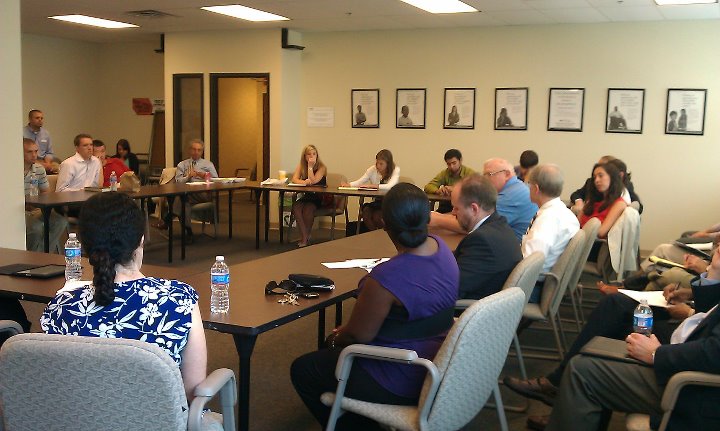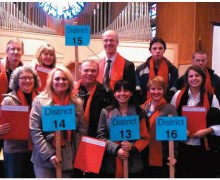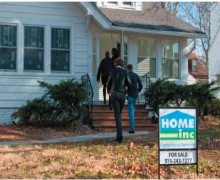Campaign for a Virginia Housing Trust Fund is Launched

In September, the Campaign for a Virginia Housing Trust Fund was launched. The statewide housing trust fund campaign was established in early 2011 by five statewide housing organizations: the Virginia Housing Coalition, the Virginia Coalition to End Homelessness, Habitat for Humanity Virginia, Housing Opportunities Made Equal, and Virginia Local Initiatives Support Corporation. To increase access by Virginians to affordable housing options, the Campaign is working toward the creation of a state housing trust fund.
The Campaign has an active website (www.virginiahousingtrustfund.org) and has engaged its supporters in numerous ways. In August it asked participants to help design the housing trust fund. The Campaign sponsored a webinar, “Help Build a Housing Trust Fund.” The intentwas to attract advocates, providers, policymakers, consumers and industry representatives from across the state to hear about the basics of a housing trust fund and to express their views through on line surveys and other tools. The Campaign heard advice on local housing needs, types of assistance the trust fund should provide, priorities, administrative features, and sources of funding. Sixty supporters registered for the call.
In September, the Campaign released its report, “The Economic Impact of a Housing Trust Fund on the Virginia Economy,” prepared by Chmura Economics & Analytics. The report supports findings from similar studies in other states and identifies two phases of potential impact: (1) the one-time impact resulting from construction activities created by the support of the fund and (2) the ongoing operations tied to housing (infrastructure) stock due to the trust fund’s implementation. The report is beneficial to other campaigns because of its clarity in the assumptions drawn and how the benefits were calculated.
Assuming a $10 million annual trust fund, the report estimates that the construction activities as a result of the trust fund investment will generate a total one-time economic impact (including direct, indirect, and induced impacts) of $1.0 billion in Virginia over a ten year period, supporting 5,893 jobs.
Of the total economic impact,
- $572.9 million will be direct spending by the housing trust fund investment, with direct jobs reaching 2,877 over the ten years.
- The indirect impact will total $228.5 million and support 1,562 jobs during the construction phase in industries supporting construction, such as site preparation and truck transportation.
- The induced impact is expected to total $220.8 million with 1,454 jobs in the state during the construction period, benefitting firms in consumer service-related industries such as restaurants, hospitals, and retail stores.
During the ten year period, the annual average impact from construction activities will be $92.9 million in Virginia supporting 536 jobs per year.
The economic impact of the ongoing operation of the trust fund comes from the apartment rentals of the housing development, as well as the household spending by residents in the planned housing developments. The total annual economic impact of the ongoing operations of the trust fund is estimated to be $331 million which can support 1,778 jobs in Virginia.
- In terms of the direct impact, the apartment rental income and direct household spending can reach $172.0 million while supporting 936 permanent jobs per year.
- An additional indirect impact of $77.8 million and 381 jobs will benefit other Virginia businesses that support the apartment rental and households spending sectors.
- The number of jobs created due to the induced impact will amount to 462 per year with associated annual spending of $81.3 million. This induced impact is mostly concentrated in consumer related industries such as restaurants, doctor’s offices, and retail establishments.

State Senator John Watkins discussed housing issues with constituents over lunch on Tuesday October 25th. The “Community Conversation on Housing” was co-organized by Project: HOMES and Housing Opportunities Made Equal. Attendees included volunteers, clients, staff and Board members from these two Richmond area non-profit housing organizations.
Both the construction and ongoing operation of the trust fund are expected to generate tax revenue for state and local governments of Virginia. Only tax revenue from the direct impact was estimated in the report. During the construction phase, individual and corporate income taxes are estimated to total $6.7 million and $2.5 million over the initial ten year period. The ongoing operations of the trust fund will also generate significant tax revenue for state and local governments. When all construction is completed after the initial ten year period, the ongoing operation of the housing developments and associated household spending can bring $8.0 million per year to local governments in Virginia. Total state tax revenues, including income and sales taxes, could reach $5.2 million per year.
The report concludes that the annual tax revenues from the Virginia Housing Trust Fund will exceed the state investment of $10 million per year.
Virginia Housing Coalition Vice President, Bob Newman, said in releasing the economic benefit study that: “Families, cities and counties, and average Virginians are struggling, through no fault of their own. We need to make sure Virginia invests in a future where people who work hard can raise a family and make a living. The Campaign for a Housing Trust Fund supports a balanced approach to solving our budget problems that includes investments in a Housing Trust Fund.”
Keeping its supporters engaged, in October, the Campaign used an online survey to determine the readiness of housing providers around the state to use a Housing Trust Fund. The survey met with an overwhelming response from 125 organizations from all parts of the state and serving a wide range of housing needs. Three quarters of the respondents indicated that they would be able to use Housing Trust Fund monies immediately. During the first 18 months of implementation, the results demonstrated that the industry would be able to provide housing assistance for more than 6,000 households and could use close to $90 million in funding.
The types of assistance identified included:
- Temporary rental assistance and services for homeless families and individuals,
- Programs to keep families facing foreclosure in their homes and return empty and foreclosed homes back into use,
- Assistance and housing to persons with special needs,
- Housing and accessibility improvements for seniors,
- Production of new affordable rental housing, including supportive housing, and
- Preservation of affordable rental housing that is at risk.
In addition to the online survey, the Campaign conducted telephone surveys with thirteen high volume affordable housing developers and providers. All of the respondents were supportive of the Housing Trust Fund.
Virginia is currently only one of eight states in the country without a state housing trust fund and the Campaign for a Virginia Housing Trust fund intends to change this. The Campaign believes the housing industry is a critical part of the local economy in Virginia. The collapse of the homeownership market has had a profound economic impact, including the loss of jobs in the construction, sales and financing sectors. With the homebuyer market in crisis, new pressure on rental housing is driving up rents and pushing affordable housing out of reach for many workers.
More than 30 organizations have indicated their support for the housing trust fund campaign. The Campaign is reaching for 100 supporters throughout the state. The website includes up to date information about the Trust Fund campaign. It also provides links to facebook, youtube videos, and past newsletters.
Contacts:
Bob Adams
Campaign for a Virginia Housing Trust Fund, Virginia Housing Coalition
2415 Westwood Avenue, Richmond, VA 23230
(804-767-2412)
virginiahousingtrustfund@gmail.com
Phyllis Chamberlain
Virginia Coalition to End Homelessness
P.O.Box 6613, Arlington, VA 22206
(703-250-4904)
phyllis@vceh.org








